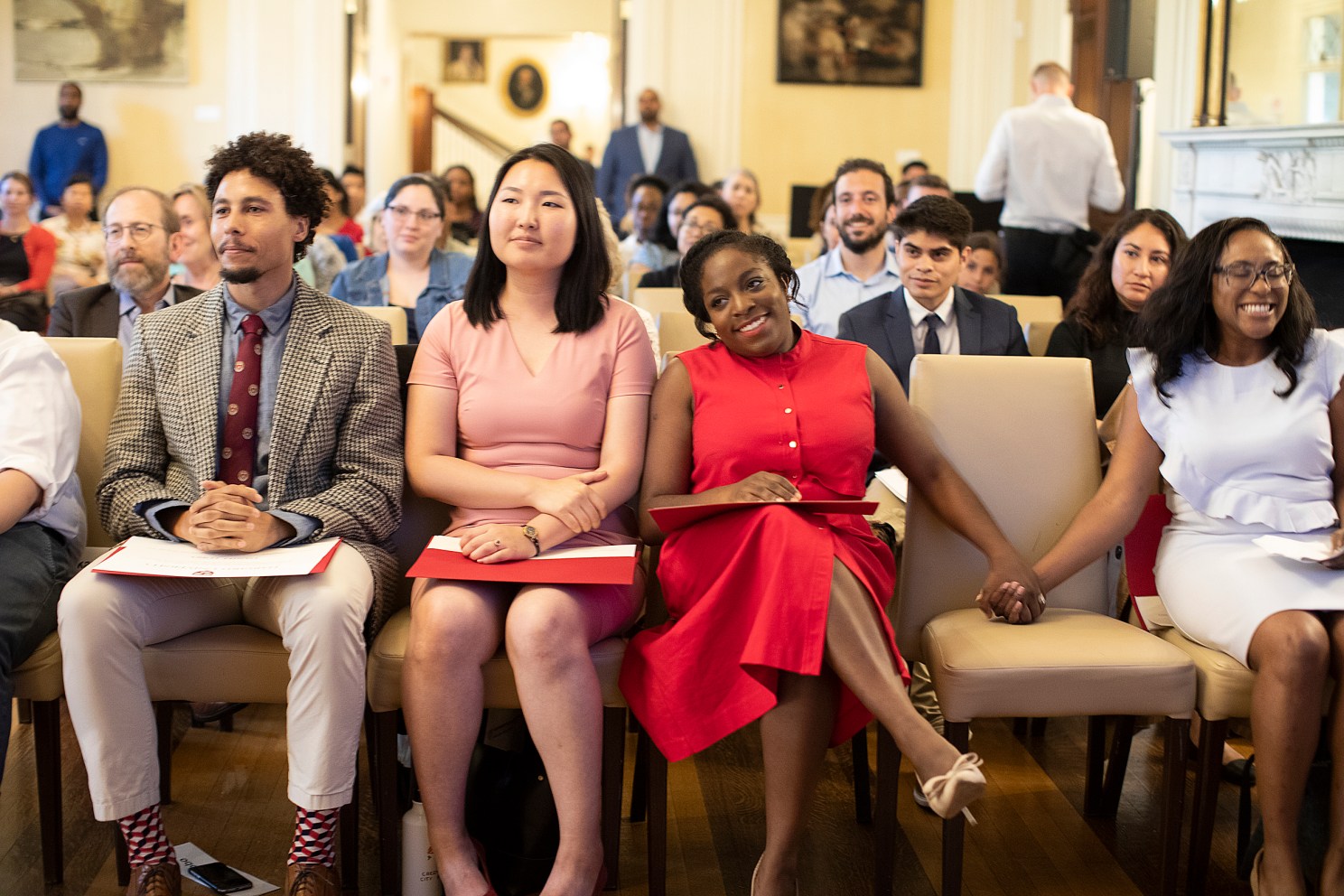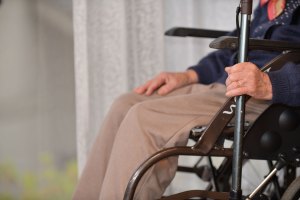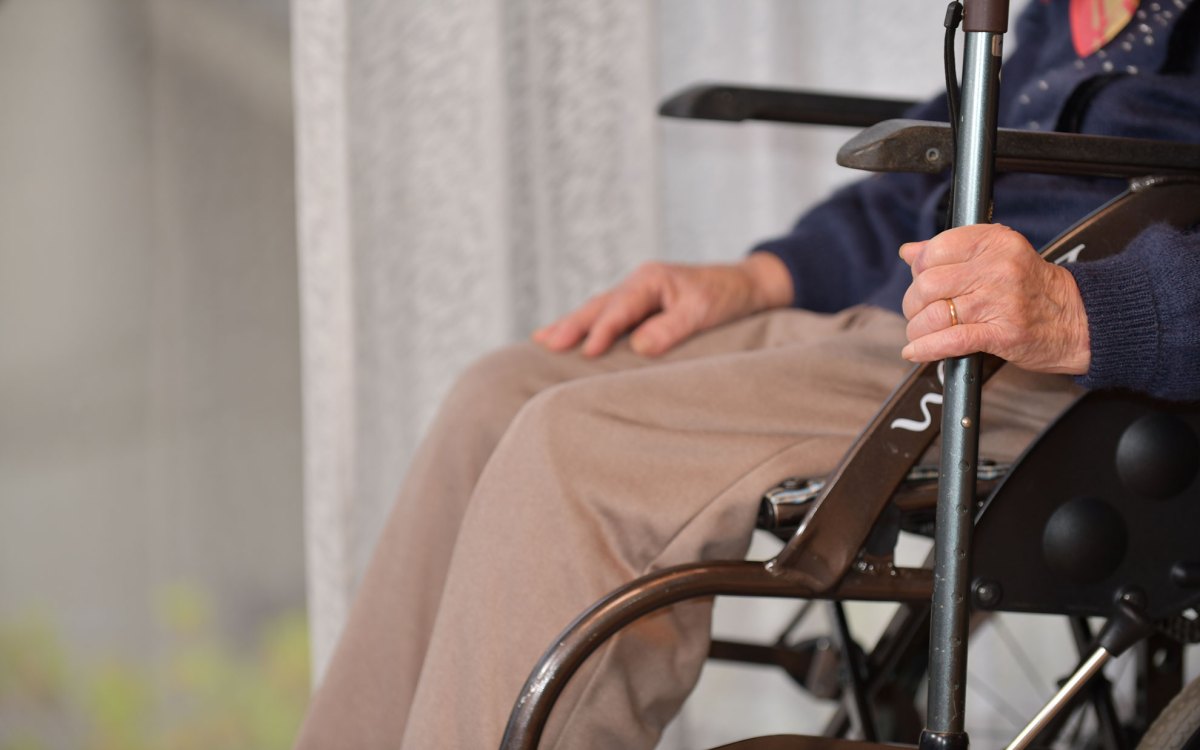Administrative Fellowship Program awards certificates

Harvard Administrative Fellows congratulate each other after speaking at the AFP closing ceremony./Rose Lincoln
During the closing ceremony, the Administrative Fellowship Program celebrated its 2018-19 class of fellows by presenting them with certificates of completion in Loeb House.
Administered by the Center for Workforce Development, AFP is a University-wide, year-long leadership development program. It provides talented professionals from underrepresented backgrounds an opportunity to build their management skills and work in a significant academic administrative role in the Harvard community. The program is now in its 30th year and emphasizes enhancing the fellows’ administrative and professional skills, growing their leadership capabilities, clarifying their career objectives, and promoting careers in higher education.
Created to address the ongoing underrepresentation of leaders of color at Harvard, AFP is widely regarded as one of the cornerstones of Harvard’s diversity and inclusion efforts.
“It really has been a model,” said Harvard Provost Alan Garber, who spoke at the ceremony and presented the fellows with their certificates. “We are in the talent business and this program has nurtured talent for a long time and it also is an important component of how we think about and how we address issues of diversity and inclusion and especially belonging.”
This academic year, AFP hosted 21 fellows, eight of whom were visiting fellows — meaning they were recruited from outside the University — and 13 of whom were resident fellows, who were identified by their respective departments at Harvard and selected by the fellowship program review committee.
Resident fellows were Mahlet Aklu, Michelle Cicerano, Ethel Falaise, Sandra Genere, Tracie Jones, Khanh Anh Le, Rebecca Martin, Amber Moore, Cristin Nelson, Daniel Scarver, Amanda Sharick, Ngoc Tran, and Youlim Yai. Visiting fellows were Sadé Abraham, Chelsea Doub, Joanne Kang, Daniel Lobo, Anne Valerie Imparato, Mitch Nakaue, Sara Rogers, and Juan Siliezar.
Their placements this year ranged from the libraries, offices, and Schools across the University.
At the ceremony, fellows who spoke on behalf of their cohort all remarked on the strong sense of community they found among cohort members and their shared experiences.
“Every AFP session has been simultaneously a sigh of relief and a breath of fresh air,” said Anne Valerie Imparato, a visiting fellow placed in the Office of Dispute Resolution. “Hearing my experiences reflected back to me, through the voices of the many brilliant and diverse professionals here at Harvard has made a world of difference to me personally and I know to many of the other visiting [and resident] fellows in our cohort.”
As part of the program, fellows attend seminars, group workshops, lectures, and case studies delivered by outside guests, school deans, vice presidents, major office directors, and faculty across the University. The program curriculum covers various aspects of higher education leadership and academic administration. In addition, the series also familiarizes the fellows with the day-to-day systems and operations within the Harvard environment and also allows fellows to discover University-wide resources and cultivate professional networks and contacts.
[gz_photo_layout_hanging_cap image=”278274″ caption=”Harvard%20Administrative%20Fellows%20applaud%20their%20peers.” credit=”Rose%20Lincoln%2FHarvard%20Staff%20Photographer%20″ /]
“AFP gave us not only communal and cohort support but also designed and maintained an entire structure of professional and personal development,” said Sadé Abraham a visiting fellow placed in the Office of Diversity Education & Support.
Ethel Falaise, a resident fellow from the Faculty of Arts and Science Registrar’s Office, and Daniel Scarver, a resident fellow from the Harvard Graduate School of Education, agreed, especially in how the professional development sessions impacted the fellows’ leadership skills.
“AFP has given us space and opportunity to reflect on our individual leadership and become more aware of who we are as leaders,” Scarver said. “That matters.”
“Through the informal luncheons with senior leaders, peer mentoring circles, and opportunities to network with individuals across different schools, we’ve learned much more than any classroom setting could provide,” Falaise said. “These sessions were empowering, affirming, and thought provoking.”
Since its start in 1989, AFP has hosted more than 300 fellows, some of whom have gone on to be senior leaders at the University. Alumni include Josephine Kim from the Harvard School of Dental Medicine, Joan Reede at Harvard Medical School, and Beth Banks at the Harvard Kennedy School.
Outside of Harvard, former fellows have pursued a number of leadership opportunities in higher education, such as Leslie Fenwick, dean emerita and professor of educational policy leadership at Howard University; Pamela Prescod-Caesar, vice president of human resources at Swarthmore College; Keith Hargrove, dean and professor of mechanical and manufacturing engineering at Tennessee State University; and Jabbar Bennett, associate provost and chief diversity officer at Northwestern University.
“AFP provides community and safety to future leaders of color, in a format that is one of its kind,” said Surabhi Chatterjee, diversity program manager at CWD. “The shared sense of purpose gives these future leaders — and Harvard – a way to create innovation for now and for the future of higher education.”
In her remarks, Imparto stressed for the Harvard administrators in attendance to keep the program at the forefront of their considerations when hiring.
“I hope that you walk away understanding the depth of this program when you are out there hiring and recruiting for new leadership positions,” Imparto said. “The unanimous wishes of all of my colleagues and cohort members for all of you in attendance today are: ‘I wish people, specifically Harvard decision makers, knew that AFP is an incredible resource for understanding how people of color, LGBTQ+ folks, folks from working class backgrounds, and other minority employees experience Harvard.’ AFP is more than a community, it’s an incubator of leaders and champions.”





